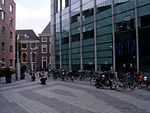Joods Historisch Museum
History museums in the NetherlandsJewish Dutch historyJewish museumsJewish organisations based in the NetherlandsJews and Judaism in Amsterdam ... and 3 more
Museums established in 1932Museums in AmsterdamThe Holocaust in the Netherlands

The Joods Historisch Museum (Dutch pronunciation: [ˌjoːts ɦɪsˈtoːris myˈzeːjʏm]; English: Jewish Historical Museum), part of the Jewish Cultural Quarter, is a museum in Amsterdam dedicated to Jewish history, culture and religion, in the Netherlands and worldwide. It is the only museum in the Netherlands dedicated to Jewish history.
Excerpt from the Wikipedia article Joods Historisch Museum (License: CC BY-SA 3.0, Authors, Images).Joods Historisch Museum
Nieuwe Amstelstraat, Amsterdam Centrum
Geographical coordinates (GPS) Address Website External links Nearby Places Show on map
Geographical coordinates (GPS)
| Latitude | Longitude |
|---|---|
| N 52.366944444444 ° | E 4.9040277777778 ° |
Address
Joods Historisch Museum
Nieuwe Amstelstraat 1
1011 PL Amsterdam, Centrum
North Holland, Netherlands
Open on Google Maps











